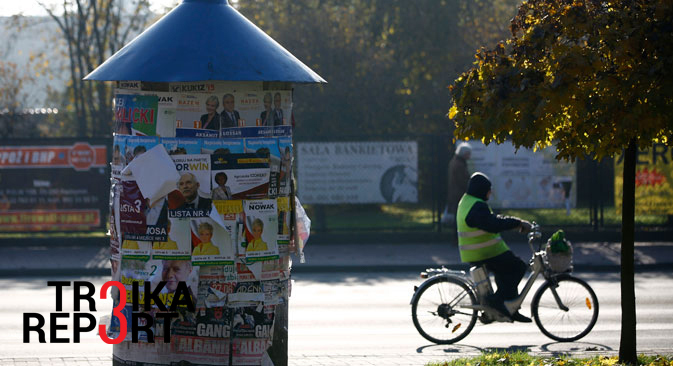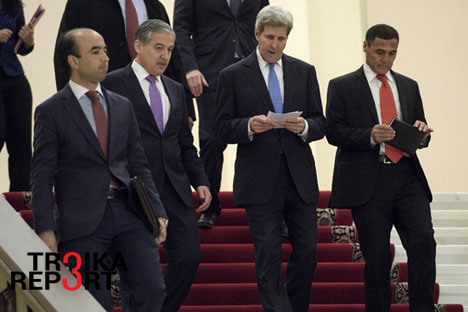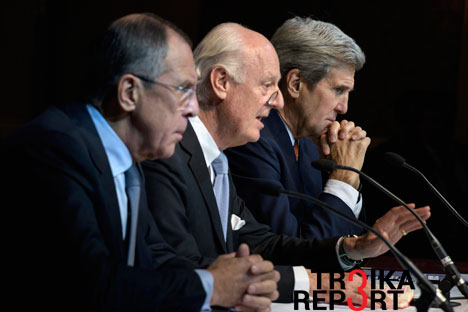Poland: Could anyone spell PiS as 'peace?' Is it worth trying?

An advertising pillar covered with election posters is seen in Radzymin near Warsaw, Poland, Oct. 27, 2015.
ReutersRecent Polish parliamentary elections, if viewed at face value, present a major setback compared to the moderate and pro-EU policies pursued by the dethroned Civic Platform-Polish People's Party coalition government, and slim chances of bettering relations with its immediate big neighbor, Russia. However, the right-left political pendulum often swings in mysterious ways.
True, the nationalist Law and Justice party (PiS), chaired by hard-line politician and former Prime Minister Jaroslaw Kaczynski, subscribes to a set of values that do not promise easy times for neither Brussels nor Berlin or Moscow.
Among other things, Kaczynski keeps blatantly accusing Moscow of masterminding a hideous plot to assassinate his brother, the then President Lech Kaczynski who perished in a plane crash near the Russian city of Smolensk in 2010. With no facts to support this allegation, the PiS leader invokes a Russophobe ethos that some parts of Polish society hold as tradition. It works, since prejudices are known to die hard.
The EU is no less apprehensive as to how to engage with the right-wing government in Warsaw, notably on several crucial dossiers including: refugee quotas; the dismantling of the heavily-polluting coal industry, regarded by PiS as the pillar of national energy sovereignty; the handling of the eroding European unity crisis in Eastern Ukraine; and dealing with Moscow and in particular applying EU sanctions, which are hailed by Polish nationalists as the ultimate and only way of dealing with Russia.
What’s more, there is the likelihood that PiS will in no way be a “party of peace” but rather a party of war. Warsaw was heavily involved in the agreement that led to Viktor Yanukovich’s removal from power and remains until now the formal patron of the pro-U.S. and pro-EU government of Petro Poroshenko. But…
Since some politicians in Kiev sympathize with Nazi collaborators in order to help mold an ideological platform and beef up nationalist sentiment, Polish public opinion has become more and more disgusted with the elevation of those who are responsible for the massacre of Polish civilians in Volhynia and Eastern Galicia, which took place between 1943 and 1944, to the status of “heroes of Ukraine.” The change of mood in Poland with more citizens leaning towards nationalist ideology leaves little chance for preserving the status quo in relations with Ukraine.
This week Russia marked the Day of National Unity. Basically, this holiday commemorates the expulsion of the Polish invaders back in 1612, with local bloggers rekindling patriotic sentiments with an unfortunately inevitable aversion to Slavic neighbors with whom they share a lot in terms of common history (the Russian empire for some time incorporated Poland), culture and other similarities.
Now, under the new circumstances, is it all gloom and doom for re-starting a dialogue between Moscow and Warsaw? Will relations still be handicapped by the legacy of this constructed animosity? Sergei Utkin, head of the Strategic Assessment Department at the Center for Situation Analysis at the Russian Academy of Sciences, sounded cautiously pessimistic for a change when discussing the matter with the Troika Report.
“The troubles in Russian-Polish relations started a long time ago and were exacerbated by the Ukrainian crisis.”
“In the years to come we probably can’t expect any progress to turn the relationship into better shape. But small steps could be made to stabilize the relationship if both sides are willing to do it. So far in Poland politicians of various leanings welcome a larger NATO military presence on their soil and this will not endear Russia. It is not an easy task to find common ground. Yet both countries would gain from more stable political relations and economic cooperation.”
A slightly more positive scenario was drawn up for the Troika Report by Nadezhda Arbatova, head of the European Political Studies department within the Institute of World Economy and International Relations at the Russian Academy of Sciences, and co-chairperson of the Trialogue Forum involving Russia, Poland and Germany.
“The victory of the right-wing Law and Justice party will not necessarily result in the deterioration of bilateral relations. A great deal will depend on how far to the right the party’s pendulum swings. If it goes too far in this direction, it risks losing all the advantages achieved by the previous government. There are objective restrictions to PiS anti-EU sentiments and its Euroscepticism. I think it would be tempting for the new government to establish workable relations with Russia on a pragmatic footing.”
The formidable obstacle, as phrased by Polish liberal journalist Ziemowit Szczerek, is the heavy dependence of PiS on the “naiveté and fanaticism” of its supporters. This unmerciful verdict might be a bit of an exaggeration. At least, these two qualities can hardly be the dominant trait of the PiS leadership if we consider Jaroslaw Kaczynski (and his role in the party). Conservatives by definition tend to calculate properly what they deem as the “national interest,” and this could be the lynchpin of a newly launched rapprochement between Moscow and Warsaw.
After all, the PiS-appointed Prime Minister Beata Szydlo while saying the usual mantra that “Russia is first and foremost an adversary” preceded it with a conciliatory overture: “we would like to see Russia as an economic partner.” The finale of the sentence was no less positive: “We must remember that wise economic policy and diplomacy can be very helpful on this issue.”
This is exactly what Troika Report is supportive of: “wise” diplomacy. Over last two years Moscow has proved it has the brains and guts to conduct a proactive and effective foreign policy.
Let’s take into account several worthwhile breakthroughs on thorny issues, including setting the four-party Minsk negotiations into motion over the civil war in Ukraine and the future of rebel republics in Donbass, coming to a settlement on the Iranian nuclear deal and persuading archenemies like Saudi Arabia and Iran to start talking to each other to bring peace to Syria.
In all of these “cause célèbres” Moscow showed restraint and eagerness to accommodate opposing opinions and alternative options. It never allowed itself or others to take the “my way or the highway” approach, while building up the image of an honest broker.
PiS would be a difficult partner. But Moscow has a track record of establishing workable relations with conservative political forces in many places, from Republican administrations in the U.S. to Gaullist politicians in France.
Today could be another moment of truth. Moscow would be “wise” to capitalize on these gains to positively engage with Poland, irrespective of the initial response, and keep trying to open up and activate all channels of communications.
The opinion of the writer may not necessarily reflect the position of RBTH or its staff.
More inspiring stories in your box!
All rights reserved by Rossiyskaya Gazeta.
Subscribe
to our newsletter!
Get the week's best stories straight to your inbox

